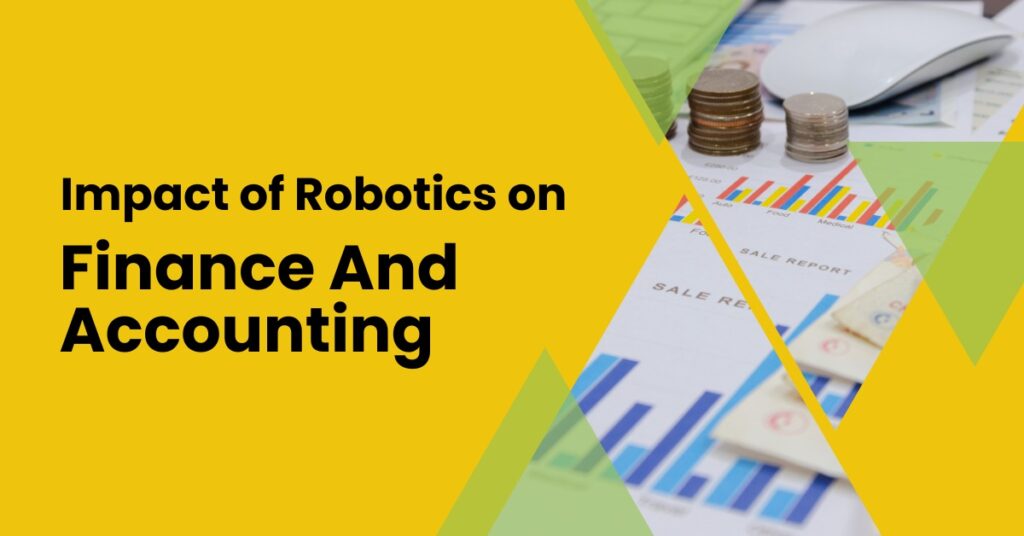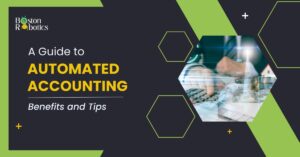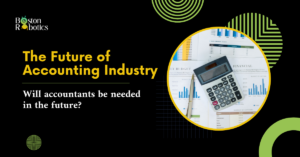Robotics has revolutionized the way we approach many industries, and finance and accounting are no exception. The introduction of robotics into the finance and accounting industry has drastically changed the face of the industry, from streamlining processes to providing more accurate and efficient results. Robotics has enabled finance and accounting professionals to make better decisions, increase data accuracy, and reduce costs. In this blog, we will discuss the impact of robotics in the finance and accounting industry and how it is transforming the way organizations do business. We will also look at the potential benefits of robotics for finance and accounting professionals and the challenges associated with implementing robotics in the finance and accounting industry.
What is Robotic Process Automation (RPA) in accounting?

RPA is a software technology that helps people do their jobs better by automating some of them. Today’s accountants employ technologies and processes that depend on computers and include a lot of manual steps and keystrokes. RPA can change the way accounting work is done by putting together different tasks into a single, smooth, automated procedure. Here’s how to automate robotic processes in a simple way:
- First, when users are doing accounting chores, the RPA bot records what they do on the screen, like clicks and keystrokes.
- Second, the software makes a script based on what the user does on the screen.
- Third, the RPA bot employs created scripts to automate accounting processes that are done over and over again based on rules.
RPA bots act like people when they do a task within a process. These software programs can do jobs over and over again swiftly, correctly, and reliably. RPA is a unique chance for accountants to improve the way they do their jobs.
Why do enterprises require RPA-based accounting automation?

As a manager or member of the C-Suite, it’s up to you to discover answers to new and upcoming problems for your company. Problems spur innovation and push digitization forward. Gartner says that by 2022, 90% of large enterprises will have embraced RPA. Using RPA to automate accounting can help your business adjust to the new normal and do well in these hard times. Here are 5 reasons why your company needs RPA to automate its accounting:
Worker Shortages:
After a pandemic, industries that rely on a lot of workers, like transportation and retail, could face a scarcity of workers. As the CEO or manager of a company, you should use effective techniques to keep the people that work there. Processes can become less dependent on human labor in your business if you automate them. Using RPA, you may automate accounting tasks to make your team’s work easier. Then, move the extra hours of labor to other activities or departments to make up for a lack of workers.
Service Provided:
Customers today have easy access to many choices. To stand out from the crowd, always give your customers the greatest service and experience. The last thing you want is to lose a customer or supplier because you took too long to pay an invoice. In accounting, you may use RPA to automate operations that take a lot of time and improve service delivery and the client experience.
Regulation Compliance:
With more and more businesses using cloud-based technologies, the business world has grown beyond the office. Companies are finding it harder and harder to keep up with global and industry standards for regulatory compliance. Using RPA can help you make sure that accounting best practices and policies are followed correctly and consistently across your whole organization. Use RPA robots, for instance, to make audit trails for accounting procedures that involve sensitive data. These trails make it possible to see the whole process and check its history, which lowers the chance of not following the rules.
Data Governance:
When doing accounting chores like processing invoices, you have to deal with private client information. For data governance to work well, there needs to be direct oversight to reduce the danger of data leaks and breaches. Can you manage accounting teams that work from home? You can’t do that. Your organization can solve this problem with the help of robotic process automation. For example, emails contain sensitive information and information that might be used to identify clients. (PPI). So, you may utilize RPA to get the information you need from emails to process invoices. Automating this procedure with RPA makes it less likely that data will be leaked by sneaky people inside the company.
Changes in digital technology:
AI and RPA are disruptive technologies that have leveled the playing field, giving start-ups more influence at the expense of global corporations. Start-ups can be tough competitors for large enterprises, but they can be kept at bay by investing in digital transformation. In the tech-driven market of today, digital transformation and long-term success depend on automating processes. With RPA, you can digitize invoices, automate accounting tasks, and use AI to improve how work is done. You may also measure and enhance the automation of accounting processes to keep getting better. Adopting RPA is a step that must be taken for digital transformation to happen.
Benefits of Robotics in Finance and Accounting
Robotic processes use artificial intelligence to help with a lot of jobs that need to be done again and over again. It makes it possible to understand and analyze data patterns quickly, which can help organizations in a multitude of ways, such as:
Reduced process costs: Some firms discover that giving boring, repetitive jobs to robots can save them money, primarily in the form of less payroll.
Reduced task completion time: Robotics in accounts payable and other areas of finance can assist cut down on the amount of time it takes to execute a task by a lot.
Reduced error: Errors are less likely to happen because automation in finance and accounting can cut down on or get rid of human mistakes.
More control: Some firms like automating some tasks because it gives them more control over specific things, a better understanding of how things work, and speedier reporting.
The benefits of robotics processes in business differ from place to place, but many firms that have used RPA in accounting have found that it has led to speedier outcomes and more accurate data.
What impact does robot technology have on finance and accounting?
Some firms worry that using AI or robotics would entail getting rid of human workers. They also wonder if AI would cause more people to lose their jobs. Most AI and robotics, on the other hand, would need a human workforce to oversee how they are set up and how they work.
Robots can also make firms more competitive than others since they free up people to do more difficult work and provide them access to more accurate reports. Both of these things can give a business an edge.
How do you know if RPA is right for you and your business?
To figure out if RPA will help your firm, you need to know what your goals are. Before you decide to automate parts of your organization, ask yourself these questions:
- What kinds of tasks could be automated?
- Who could be in charge of the first automation? Who will run it and keep an eye on it all the time?
- How will technology help your business?
- When would it be a good idea to use robots and automation?
Once you’ve thought about the value and benefits of using RPA in finance and accounting, you can set up a timeline and start to figure out how it will affect your business in the long run.
RPA is just starting to have an effect on enterprises. As more firms try out robotic processes, it’s probable that the ways it helps finance in terms of speed, data quality, mistake rate, and other things will only get better. Has your business done anything with RPA? Do you have any examples of how robotic process automation worked well?
Conclusion
In conclusion, robotics in finance and accounting has had a huge impact on the industry. They are able to automate mundane tasks and accurately analyze vast amounts of data quickly and efficiently, thus allowing for more accurate financial decisions to be made. They also reduce errors and reduce labor costs, making them an invaluable asset in finance and accounting. Robotics has become increasingly popular over the years and is likely to continue to be so, as they can improve the accuracy, speed, and efficiency of financial and accounting processes.
Editor’s Choice:
The Rise of Intelligent Automation: How AI and Robotics Work Together
Automation in Human Resources: Streamlining Recruitment and Onboarding Processes




